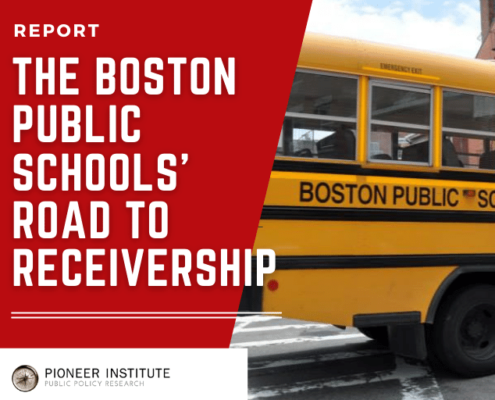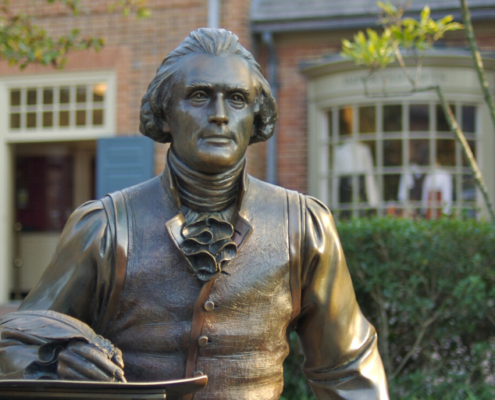
Pioneer Study: Specifics on School Pandemic Relief Spending Hard to Come By
With the deadline for spending $2.9 billion in federal pandemic relief funds now less than a year away, it’s difficult to know exactly how Massachusetts school districts are spending the money and what impact those expenditures are having on students, according to a new study published by Pioneer Institute.

Massachusetts Survey Report on US History MCAS
Sixty-two percent of Massachusetts residents support restoring passage of a U.S. history test as a public high school graduation requirement, according to a poll of Massachusetts residents’ attitudes toward education policy commissioned by Pioneer Institute and conducted by the Emerson College Polling Center.

The Boston Public Schools’ Road to Receivership
This report summarizes the findings of MA DESE’s 2020 review of the Boston Public Schools, highlighting key findings around the teaching and learning, operational, financial, and enrollment challenges the state identified. It also describes why, according to the report, BPS persistently struggles in these areas and how its struggles negatively impact students. The paper describes several options the district and the state have for rectifying the problems and helping BPS meet its constitutional and moral obligations to the students and families it serves.

Accountability in Massachusetts’ Remote Learning Regulations
0 Comments
/
This policy brief and public comment argues that the COVID-19 pandemic-related revisions to Massachusetts’ remote learning regulations should restore state and local accountability by specifying that any remote academic work shall, to the same extent as in-person education, prepare students to take MCAS tests, and that grading criteria should be the same across in-person, remote, and hybrid learning environments.

How Should Massachusetts Reopen Its K–12 Schools in the Fall? Lessons from Abroad and Other States
This report asserts that, with the fall semester fast approaching, Massachusetts should provide more specific COVID-19-related guidance for school districts about ramping up remote learning infrastructure; rotating in-person cohort schedules; diversifying methods of communication between students, parents, and teachers; and investigating physical distancing capabilities. Districts must determine whether to adopt in-person, remote, or hybrid schooling options, and they will not be ready for the fall unless the state provides clear direction.

Class Dismissed: Massachusetts’ Lack of Preparedness for K–12 Digital Learning During COVID-19
This white paper contends that the shutdown of Massachusetts schools due to the COVID-19 virus and the shift to online education have exposed the uneven nature of digital learning in the Commonwealth, and calls for state officials to develop programs to create more consistency. The study urges state officials to create a plan for the 2020-21 school year that will address the education gaps that occurred during the final semester of this school year. It also encourages a plan to address how future extended closures would be managed.

Breaking the Code: The State of Computer Science Education in America’s Public Schools
Even as the COVID-19 pandemic has further transitioned education…

The Common Core Debacle: Results from 2019 NAEP and Other Sources
This study finds that, breaking with decades of slow improvement, U.S. reading and math scores on the National Assessment of Educational Progress (NAEP) and other assessments have seen historic declines since most states implemented national Common Core English and math curriculum standards six years ago.

Keeping Students Academically Engaged During the Coronavirus Crisis – Part One
Pioneer Institute calls on the U.S. Department of Education (USED) to quickly establish comprehensive but concise guidelines for federal law around school closures. Because of the COVID-19 virus, schools have been closing rapidly around the nation, and they are trying to transition to alternative, largely online, learning programs.

Social-Emotional Learning: K-12 Education as New-Age Nanny State
Social-emotional learning (SEL) has been billed as a transformational tool that will propel students to greater academic achievement and personal fulfillment. Unfortunately, the research evidence to back up these claims is thin and unpersuasive. Moreover, the risks SEL poses to student privacy and health are significant.

Axioms of Excellence: Kumon and the Russian School of Mathematics
At a time of declining state and national math proficiency, after-school math programs offer a viable option for quickly increasing the number of mathematically competent students. In this study, Pioneer Institute profiles two such programs: Kumon and the Russian School of Mathematics.

Common Core, School Choice and Rethinking Standards-Based Reform
While U.S. academic performance has declined since the broad implementation of Common Core, school choice programs are increasingly hamstrung by regulations that require private schools to adopt a single curriculum standards-based test as a condition for receiving public money, according to a new study published by Pioneer Institute.

Is Two-Tiered Education on the Rise in Massachusetts?
A review of the performance of Massachusetts students on National Assessment of Academic Progress 4th-grade reading and 8th-grade math tests shows that overall improvement has stalled in the last decade, but the percentage of students scoring in the top category has steadily increased.

Remarks at 25th Anniversary Event for the Massachusetts Education Reform Act
Massachusetts Education Reform Act co-author and former Senate President Tom Birmingham praised the historic success that has been achieved since the law was enacted in 1993, but expressed concern that the Commonwealth is veering away from basic principles of the law that produced that success at a State House event marking the 25th anniversary of the Education Reform Act.

2018 Proposed Revisions to Massachusetts History and Social Studies Frameworks
This public statement addresses the draft of the Massachusetts History and Social Science Curriculum Framework that was released for public comment in January. The authors argue that the new standards would follow in the footsteps of recently adopted English, math, and science standards by representing a decline in content and coherence compared to their predecessors.

Mediocrity 2.0: Massachusetts Rebrands Common Core ELA and Math
The 2017 update of Massachusetts’ English and math K-12 academic standards represents further deterioration in English, while the math standards are essentially unchanged from the 2010 version, according to the first independent evaluation of the newly revised standards. The 2010 standards, which were based on Common Core, led to declining scores on national tests in both English and math.

Expanding Educational Opportunities: Three Models for Extended Summer Enrichment Programs in Massachusetts
The last of a three-part series by Pioneer Institute on summer learning shows that Massachusetts schools establishing summer enrichment programs to close the achievement gap between lower-income and higher-income students can have a greater impact by eventually expanding the program across multiple summers or for a full year. This final paper introduces three types of extended summer enrichment models: 12-month programs, multi-year summer-only programs, and multi-year, year-round programs.

What Goes Up Must Come Down: New, Lower K-12 Science Standards for Massachusetts
This paper, the second of a two-part analysis, finds that Massachusetts’ Next Generation Science Standards adopted last spring by the state Board of Elementary and Secondary Education (BESE) fall short. The authors conclude they are unclear, unnecessarily complicated, miss important content, and fail to make important connections.

After the Fall: Catholic Education Beyond the Common Core
The workforce-preparation focus of the K-12 English and math standards known as Common Core puts them at odds with Catholic education, and the standards should not be adopted by parochial schools. In “After the Fall: Catholic Education Beyond the Common Core,” authors Anthony Esolen, Dan Guernsey, Jane Robbins, and Kevin Ryan argue that the national standards’ unrelenting focus on skills that transfer directly to the modern work world conflicts with Catholic schools’ academic, spiritual, and moral mission.

Expanding Educational Opportunities: Best Practices in U.S. Summer Enrichment Programs
This report is the second of a three-part Pioneer Institute series of studies on summer enrichment programs with a particular focus on opportunities for disadvantaged students. It highlights best practices in the field by profiling a range of summer programs. The authors urge summer enrichment programs to partner with entities that help place disadvantaged children in educational programs to help the schools and non-profits recruit students. They also urge programs run by schools to use academic-year faculty.

Survey of Summer Enrichment Programs at Independent and Parochial Schools in Massachusetts
A survey of more than 70 Massachusetts private and parochial schools found that most offer academically-oriented summer programs, which have been found to prevent summer learning loss and can help close the achievement gap among student groups. The survey is the first of a three-part study that will yield a comprehensive guide to summer enrichment programs in the commonwealth.

Fordham Institute’s Pretend Research
The Thomas B. Fordham Institute has released a report, Evaluating the Content and Quality of Next Generation Assessments, ostensibly an evaluative comparison of four testing programs, the Common Core-derived SBAC and PARCC, ACT’s Aspire, and the Commonwealth of Massachusetts’ MCAS. The latest Fordham Institute Common Core apologia is not so much research as a caricature of it.

Setting Academic Performance Standards MCAS vs PARCC
Author and career testing expert Dr. Richard Phelps writes that adopting PARCC would result in a one-half year drop in performance expectations for 4th grade math and reading, and 8th grade math, in Massachusetts. He also argues that critics of MCAS misunderstand its intended purpose, and explains why this is problematic.

Advanced Civics for U.S. History Teachers: Professional Development Models Focusing On The Founding Documents
A resurgence of interest in civic virtue and a new emphasis on teaching civics in our schools is needed in our country. Teachers need opportunities beyond college to learn the intricacies of government and how to teach it. Pioneer Institute reached out to four professional development programs with nationally known reputations to learn more about their offerings.

How PARCC’s False Rigor Stunts the Academic Growth of all Students
This report concludes that revising and updating MCAS would result in lower costs and more rigorous assessments that would provide better information about student performance than adopting PARCC.

A Critical Review of the Massachusetts Next Generation Science and Technology/Engineering Standards
Massachusetts’ draft pre-K through introductory high school Science and Technology / Engineering standards contain such startling gaps in science that they should be withdrawn from consideration.

Federal Overreach and Common Core
This report provides the historical background and interpretive analysis needed to understand controversies surrounding Common Core and its associated tests.

Support & Defend: The K-12 Education of Military-Connected Children
In-depth analysis of how the Department of Defense Education Activity (DoDEA) provides high-quality education to more than 84,000 eligible Military-Connected Children in more than 190 schools around the world and scores above the national averages on nearly all standardized assessments. This report also examines efforts to expand that success to Military-Connected Children attending non-DoDEA schools.

Pioneer Institute Statement on MBAE PARCC/MCAS Study
The Massachusetts Business Alliance for Education (MBAE) continues its advocacy for Common Core and the Partnership for Assessment of Readiness for College and Careers (PARCC), a federally funded testing consortium, with the release of a study concluding that Massachusetts Comprehensive Assessment System (MCAS) performance is not an indicator of preparedness for higher education success.

Imperiling the Republic: The Fate of U.S. History Instruction under Common Core
The Founders of the American experiment in democracy assumed that understanding American history was essential in a Union where publicspirited citizenship and the capacity to live under laws “wholesome and necessary for the public good” would characterize the new nation. To proceed without the knowledge of history, in their view, was a sure path to “a tragedy or a farce.”
